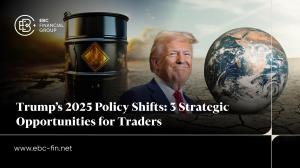EBC Financial Group explores how Trump’s climate policy reversal may reshape global markets, commodities, and trade amid rising uncertainty.
WA, UNITED STATES, February 7, 2025 /EINPresswire.com/ -- As Donald Trump’s 2025 agenda takes shape, global markets are preparing for a wave of volatility across energy, trade, and fiscal policies. With anticipated shifts in fossil fuel production, aggressive tariff strategies,
and sweeping tax reforms, traders must be ready to navigate a rapidly evolving landscape. EBC Financial Group (EBC), a leader in financial solutions, has analysed these developments to help businesses and market participants better understand the evolving economic landscape.Energy Markets in Flux: How to Trade Oil and Gold Amid Trump’s Fossil Fuel Push
A central aspect of Trump’s policy agenda involves reversing renewable energy incentives while bolstering fossil fuel exploration. These measures are expected to have widespread effects on commodities markets. While oil prices may face downward pressure due to oversupply, this volatility creates opportunities for traders to capitalise on price swings.
• Oil Prices: Track EIA crude inventory reports; oversupply trends may signal short-selling opportunities.
• Gold as a Hedge: Uncertainty surrounding climate deregulation and potential global responses may contribute to shifts in demand for safe-haven assets such as gold and silver.
Trade and Fiscal Policy
Trump’s renewed focus on protectionism and economic nationalism is reshaping trade and fiscal landscapes, with ripple effects across global markets. One of the administration’s proposed measures includes increased tariffs on Chinese goods, which could strain supply chains, elevate costs, and create challenges for businesses reliant on global trade networks.
In addition, Trump’s fiscal policy agenda introduces corporate tax reductions aimed at stimulating domestic investment and industrial activity within the U.S. However, this approach may also contribute to increased national debt levels, with the IMF projecting that U.S. deficits could push the debt-to-GDP ratio to 140% by 2032. Such developments could have long-term implications for interest rates, inflation, and broader financial market stability.
Forex Markets: Navigating Tariff-Driven Volatility
As of February 2025, President Donald Trump has imposed a 10% tariff on Chinese goods, a reduction from the initially proposed 60%. While this policy has introduced fluctuations in currency markets, the Chinese yuan has remained resilient, supported by Beijing’s proactive economic measures and strong trade partnerships, which continue to reinforce market confidence.
Key Considerations for Traders:
• Focus on Safe-Haven Currencies: Periods of trade uncertainty often drive demand for perceived safe-haven assets, including the U.S. dollar (USD) and Swiss franc (CHF). Traders may consider strategic positions while accounting for policy-driven volatility.
• Monitor Yuan Stability: Despite external pressures, China’s strategic economic initiatives have helped sustain yuan stability. Traders should closely monitor policy adjustments and global market reactions, identifying opportunities to hedge or rebalance exposure where necessary.
For more information on the impact of policy shifts, visit www.ebc.com.


No comments:
Post a Comment